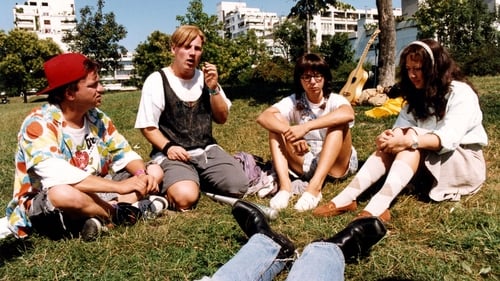
Sound

Sound
"Restless Solitude" is the story of young people who begin to perceive themselves in the context of their surroundings, though they cannot find an acceptable world within our civilized society. Instead of being accepted by a community, they see themselves as trapped in their adolescent dreams, because a world oriented exclusively towards material values cannot offer them an ideal place to live. Either one's spirit is broken when the individual is integrated into society, or the individual breaks with society. In both cases, the young adult is susceptible to seduction in a number of possible ways, eventually becoming a victim rather than a member of society.

Sound

Sound
An economics expert from the West is contracted by a large firm to assist in the reorganization of a debt-ridden steel plant in the former Eastern Bloc. Believing himself to be eagerly awaited, he finds that his position has already been taken: Another man has already begun the job in his name, obviously with official approval. What first appears to be a strange mix-up soon turns into a threat to his existence when he discovers that not only his professional, but also his private identity has been assumed by the stranger.

Sound
A tectonic displacement at the centre of a large family. No member of the family stays clear of the quake's reverberations.

Sound
Both have families, both are gripped by a perilous passion. Simon, school professor, and Helga, wife of a successful internist, get to know each other on their daily journey to kindergarten. They fall in love, but how should it go on?

Sound
48 hours in the life of the Neugebauer family. The May weekend with a small family celebration, which was planned as peaceful and contemplative, turns out to be a kind of Rocky Horror Picture Show in Vienna's municipal housing estate. Just like the other residents, the Neugebauers are preparing for the impending Mother's Day.

Sound
Leo Perutz' thriller deals with the persecution of a psychotic murderer in Vienna in 1909 who seems to lead his victims into a brilliantly hidden form of suicide.

Sound
Vienna 1934. Nora Fiala grows up in a middle class home. The atmosphere of her home and the political situation have their effect on her.

Sound
Katharina and Sonja meet by chance on a train journey to Klagenfurt. Sonja, who wants to prepare for an exam, invites Katharina to live with her. The two different girls get to know the equally opposing men Thomas and Peter. Beyond the little holiday flirtations, Sonja and Katharina discover that they fell in love with the same man in Vienna...

Sound

Sound
Portrait of a great lady based on the real life of Margarete Schütte-Lihotzky, an Austrian architect, who joined the resistance movement against Hitler.

Sound
Tommi Fischer, a newly divorced copywriter is looking for a replacement mother for his son. When he falls for the emancipated costume designer Evelyn he soon finds himself in the undesired role of a stay-at-home dad.

Sound
Judith is a maverick reporter who is also seeking a satisfying relationship with various men. She finds corruption and power-games everywhere.

Sound
In a city of the future, man has triumphed over nature and at the same time destroyed the environment. In the highly mechanized cities, all goods and services are equally available for everybody. Each person recieves an "energy chip" on their 16th birthday which serves to pay for everything: Food as well as transportation, bar visits and other leisure pastimes. When an energy account is used up, the person must die. The "executors" take care of this...

Sound

Sound
This two-part drama examines the fate of Haneke’s own generation which came of age after World War II. The first part depicts the generational gap between 1950s teenagers and their parents while the second shows this same group of characters twenty years later as they have grown up to be dysfunctional and suicidal adults. Regarded as the most significant of Haneke’s early works, Lemmings contains incipient treatments of many of the themes he would later elaborate on in his theatrical features.

Sound
This two-part drama examines the fate of Haneke’s own generation which came of age after World War II. The first part depicts the generational gap between 1950s teenagers and their parents while the second shows this same group of characters twenty years later as they have grown up to be dysfunctional and suicidal adults. Regarded as the most significant of Haneke’s early works, Lemmings contains incipient treatments of many of the themes he would later elaborate on in his theatrical features.













